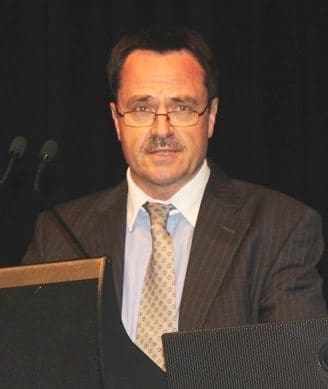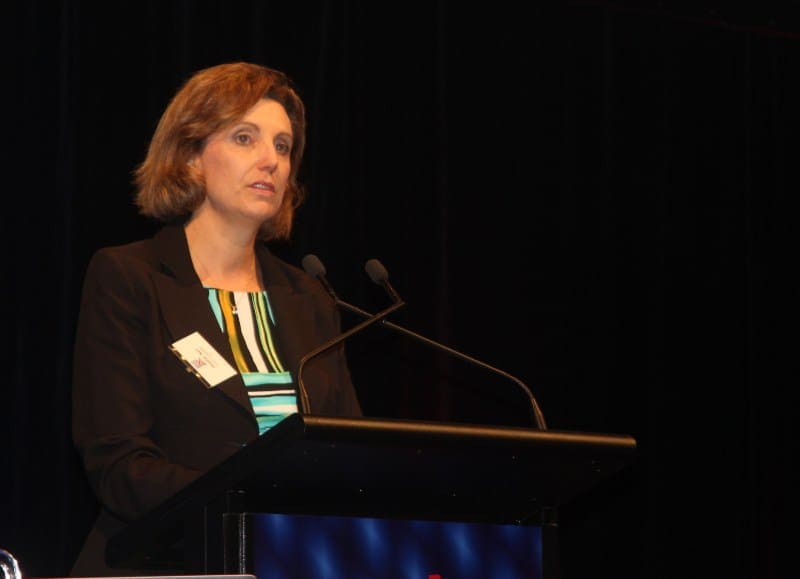A CALL for animal welfare groups to drop their campaigns to shut down the live export trade has been rejected by the RSPCA at the 2017 LIVEXchange conference in Perth.
 Immediate past Livecorp chairman David Galvin made the call at the conference yesterday after outlining the difficulties faced by the trade in the past year, but listing its progress since 2011.
Immediate past Livecorp chairman David Galvin made the call at the conference yesterday after outlining the difficulties faced by the trade in the past year, but listing its progress since 2011.
He said the last 12 months had been ‘tough and hard’ for importers and exporters, with the high prices of Australian livestock leading to importers looking for alternative protein sources and importing countries looking at domestic breeding programs.
Unfavourable exchange rates and low rainfall in Australia had slowed flock and herd rebuilding efforts, prolonging the tight supply of stock, he said.
“Change in the regulatory environment is continuing with exporters showing adaptability to respond to uncertain new requirements,” Mr Galvin said.
“This means that exporters are now confronted with some of the most difficult economic conditions in the history of the industry.”
He said last year cattle exports declined 27 percent to 835,000 head, with a value of $1.1 billion.
Sheep exports stayed steady at 1.852 million, with a value of $243 million, and most of that had been contributed by the industry in Western Australia, Mr Galvin said. Goat exports went down 63pc, with only 29,000 exported at a value of $4.7 million.
 However, even with these challenges, the industry had increased its contribution to Australia’s economy. Live exports supported 10,000 jobs in regional and rural Australia, and contributed $1.4 billion to the Australian economy yearly last year.
However, even with these challenges, the industry had increased its contribution to Australia’s economy. Live exports supported 10,000 jobs in regional and rural Australia, and contributed $1.4 billion to the Australian economy yearly last year.
Highlighting the industry’s achievements since 2011, he pointed to the training of more than 11,850 people overseas in animal welfare handling and slaughter practices, while mortalities on ships were down below 1pc for sheep and less than that for cattle.
“Ninety five percent of the cattle that go to Indonesia are now stunned before slaughter – this is up from five percent pre-2011,” he said.
He said the Indonesian industry should be proud of this animal welfare outcome, with one million-plus local cattle also being stunned prior to slaughter.
Mr Galvin said in the Middle East between 2-3 million of non-Australian sheep are now being put through abattoirs that practice OIE-ESCAS requirements.
“Since 2011 though, because of the increase in cost in delivering ESCAS in the Middle East, Europe has gone from sending 500,000 sheep per year, to sending 1.8 million sheep and 130,000 cattle a year to the Middle East.
“No animal welfare standards apply to those sheep or cattle; there are no requirements by the EU to look after them, therefore the cost to send them there and process them is much less than for Australian animals.
Mr Galvin said what has been achieved by the industry got no credit from the Greens, Animals Australia or the RSPCA.
“I call on the RSPCA and Animals Australia to work and go to Europe and lobby the European Governments to have the same animal welfare standards applied to their animals that apply to our animals. It’s only fair it’s only just,” he said.
Mr Galvin said the sector should be proud that the pre-eminent world organisation for animal health, the OIE, regarded the Australian live export industry as the greatest contributor to animal health worldwide.
“I also call on the RSPCA to drop its policy to close the industry. In doing so we can work together worldwide to push and assist even better achievements in animal welfare, and in particular I refer to European sheep and cattle going to the Middle East,” he said.
“We can collaborate on programs here in Australia and I look forward to their positive response.”
Industry has long way to go, says RSPCA

RSPCA’s Heather Neil
However, RSPCA Australia chief executive officer Heather Neil told the conference the live export industry had a long way to go in terms of transparency to get the RSPCA’s approval.
She said it was difficult to be asking for the organisation’s approval, when there wasn’t information being put on the table.
“Whilst ever there are animals being exported from Australia, we want to make sure their welfare is as good as possible, but we also need to see progress in data – data speaks,” she said.
“I think it is interesting that at least some sections of the live export industry want our approval. And to get our approval, from a policy perspective, there isn’t an animal welfare organisation in the world that supports the long distance transport of livestock,” Ms Neil said.
“From a policy perspective, the RSPCA believes that animals should be slaughtered as close to the point of production as possible.
“There are a lot of abattoirs that animals go past on the way to China and the Middle East.”
Ms Neil said the live export industry also needed to recognise that it needed to ‘lift its game.’
“It has to lift it quickly, it can’t use smoke and mirrors, it can’t say it is really hard to get stunning in the Middle East, so we won’t keep on trying.”
- Sheep Central editor Terry Sim is in Perth covering LIVEXchange for the ‘Centrals.’

HAVE YOUR SAY